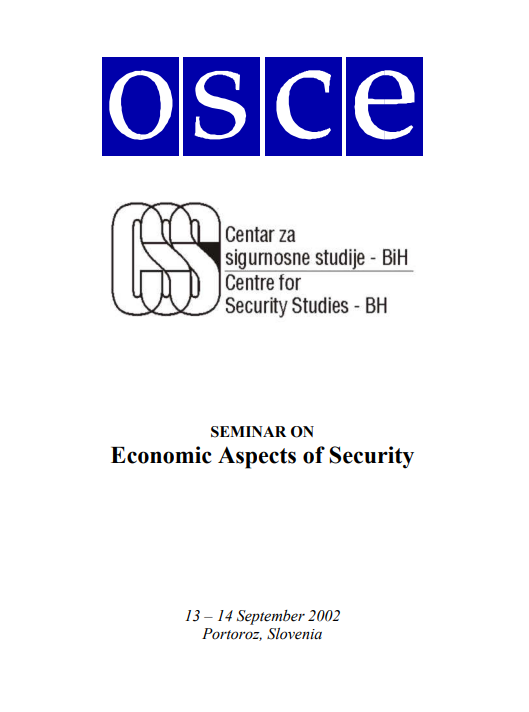Seminar on Economic Aspects of Security (2002)
Seminar on Economic Aspects of Security (2002)
Author(s): Claudio Zappulla, Ignac Golob, Bisera Turković, Anto Domazet, Ljubica Jelušič, Richard Temsch, Paolo Borgna, Dario Carminati, Nidia Casati, Robert Barić, Branislav Milinković, Neset Muminagić, Duško Vejnović, Peter Semneby, Alexander Alekseyev
Subject(s): Economic history, Political history, Economic policy, Security and defense, Transformation Period (1990 - 2010)
Published by: Centar za Sigurnosne Studije
Keywords: BiH; policy; economic aspects; security; seminar; 2002;
Summary/Abstract: His Excellency Mr. Golob, Distinguished Ambassadors, Ladies and Gentlemen, it is with great pleasure that I welcome you to this seminar in Portoroz, Slovenia. Before proceeding, I wish to thank the Government of Slovenia for graciously allowing us to hold our seminar in beautiful Portoroz. Why this seminar? Why this topic? And. Why now? Perhaps those questions have crossed your mind as you received your invitation to participate in this seminar. “Why this seminar”. To answer this question I will briefly recall some events over the past few years that have led us to Portoroz today. The Agreement for Confidence – and Security Building Measures in Bosnia and Herzegovina (Article II, Annex 1b, Dayton Peace Accords) contains one particular provision for “voluntary measures”. Under the auspices of this provision we have, over the past few years, conducted numerous seminars on topics such as “Democratic Control of the Armed Forces”, “Military Support to Civilians in Cases of Man-Made or Natural Disaster”. In particular, the seminar on Democratic Control spawned a whole series of initiatives involving NATO and OHR, as well as a number of bilateral initiatives, most notably with Switzerland and Sweden which focussed on members of the BiH government and senior military officials. In tandem with these initiatives, my office, with the gracious help of a number of OSCE countries, has sponsored Code of Conduct seminars targeting junior and mid-level officers. These seminars are an introduction into the OSCE as a body and the Code of Conduct measures adopted by the OSCE. In addition to these efforts, and still under the auspices of the Article II Agreement, the members of the Joint Consultative Commission, the body that oversees implementation of the Agreement on Confidence – and Security-Building Measures in Bosnia and Herzegovina agreed that in the interest of greater confidence and transparency they would allow a team of international auditors to conduct an audit of their respective military budgets. The aim, of course, was to show that the budgets could no longer sustain the relatively large military forces maintained in Republika Srpska and the Federation of Bosnia and Herzegovina. This audit process was hugely successful and evolved into a mammoth initiative that was given to Ambassador Beecroft and his staff. Arguably, it was this initial audit decision that has subsequently led to the tremendous restructuring and demobilization process that is on-going. This is of course a painful process but a necessary one that will lead to a military structure more compatible with actual defense and security needs and will move Bosnia and Herzegovina one step closer to European integration.
Series: Centar za Sigurnosne Studije - MISCELLANEOUS PAPERS
- Page Count: 129
- Publication Year: 2002
- Language: English
- Content File-PDF

